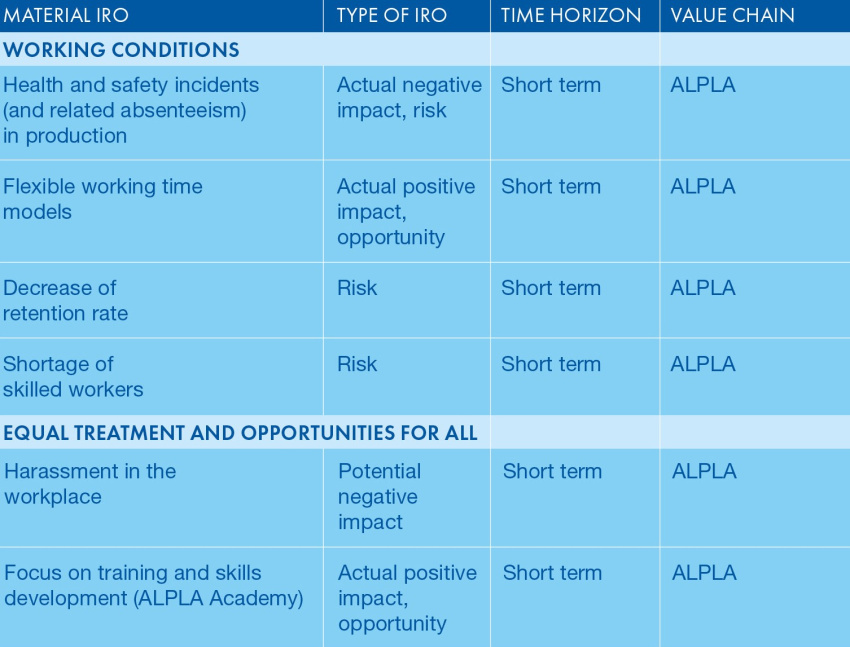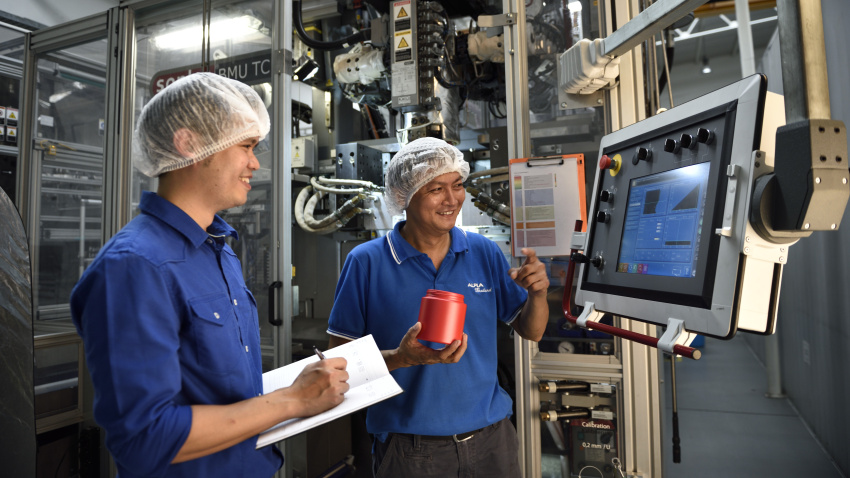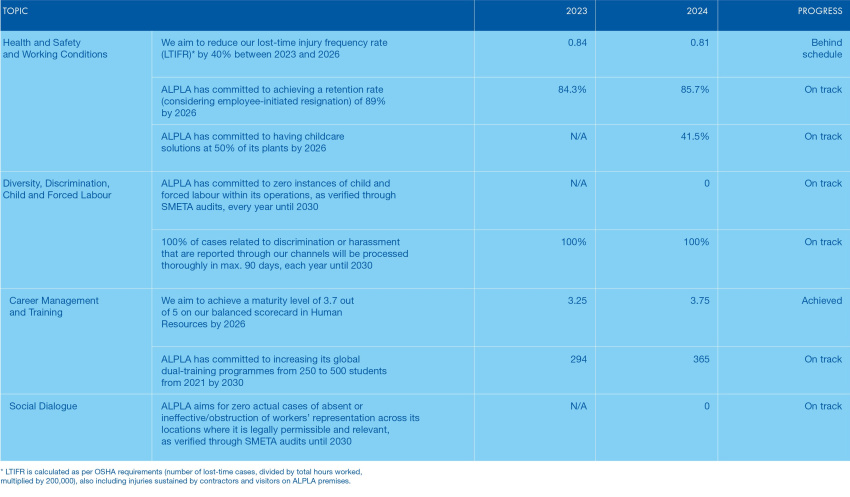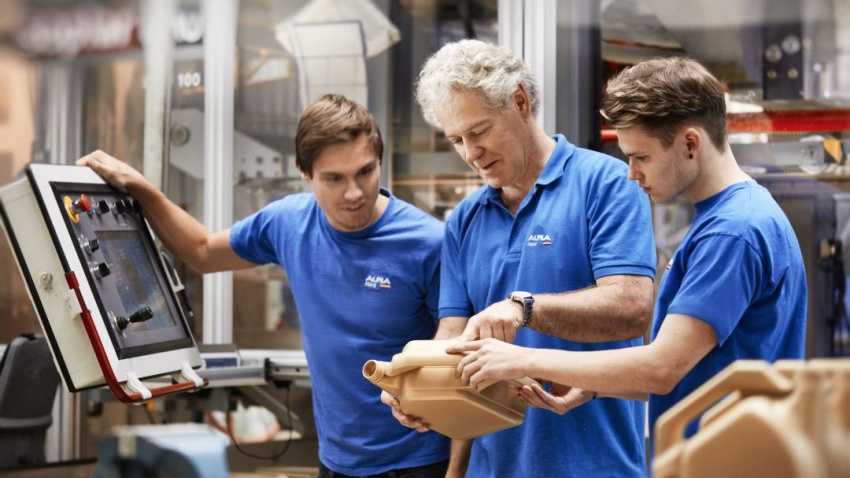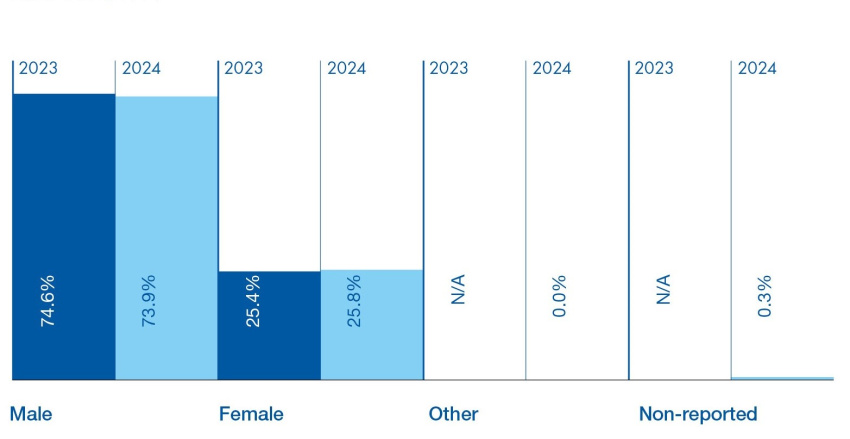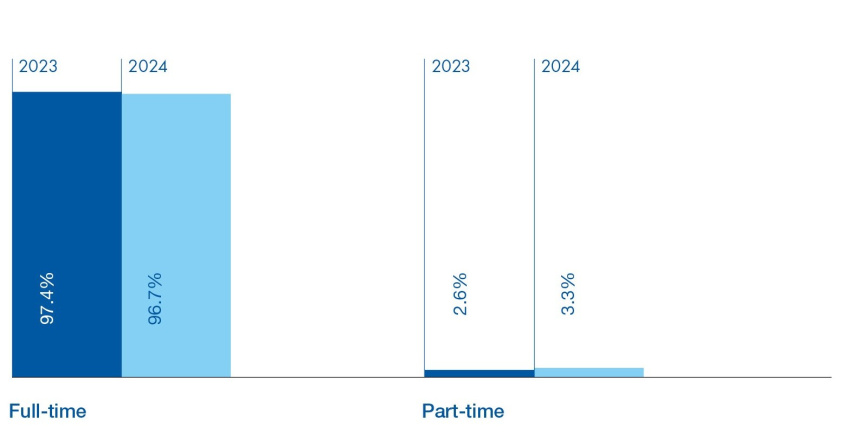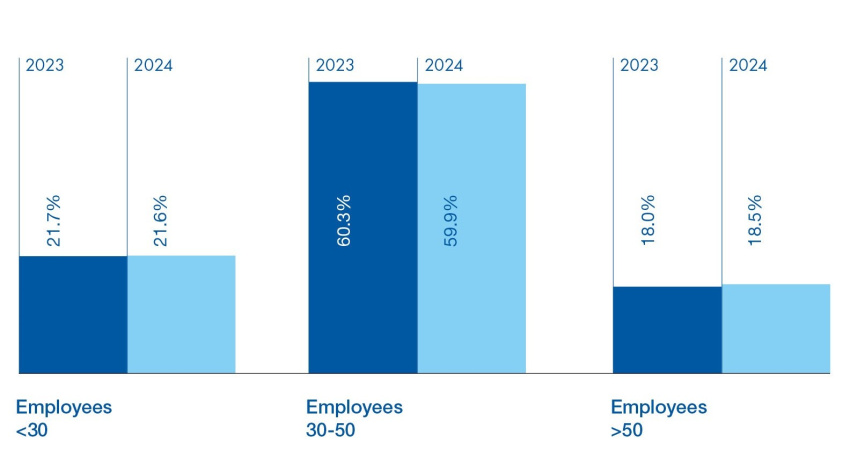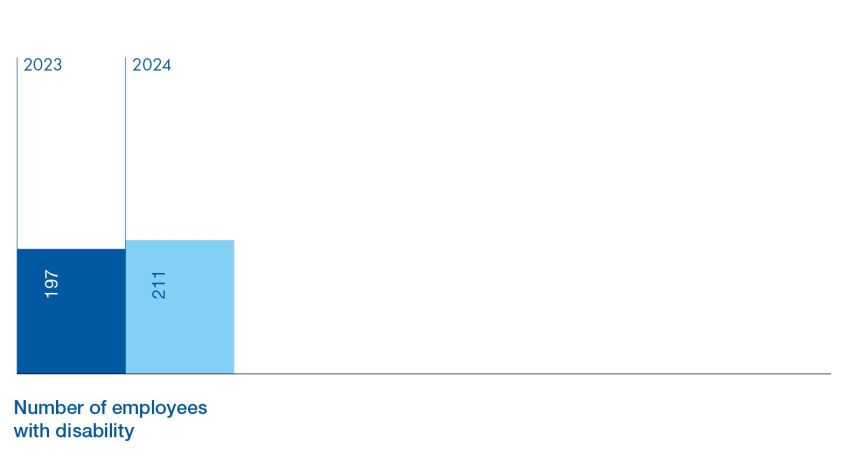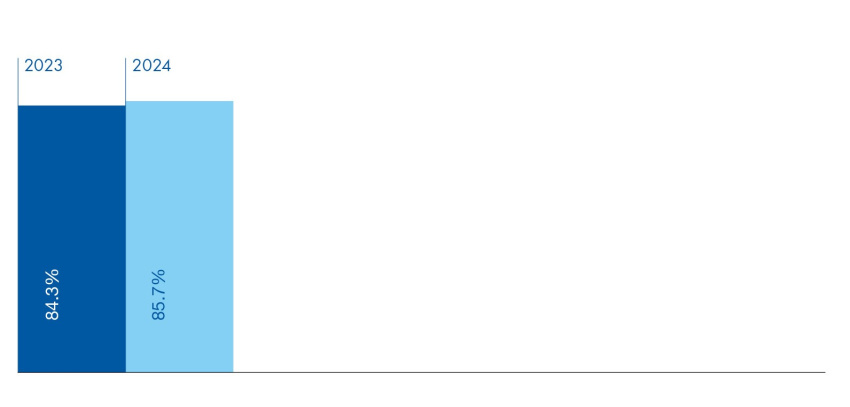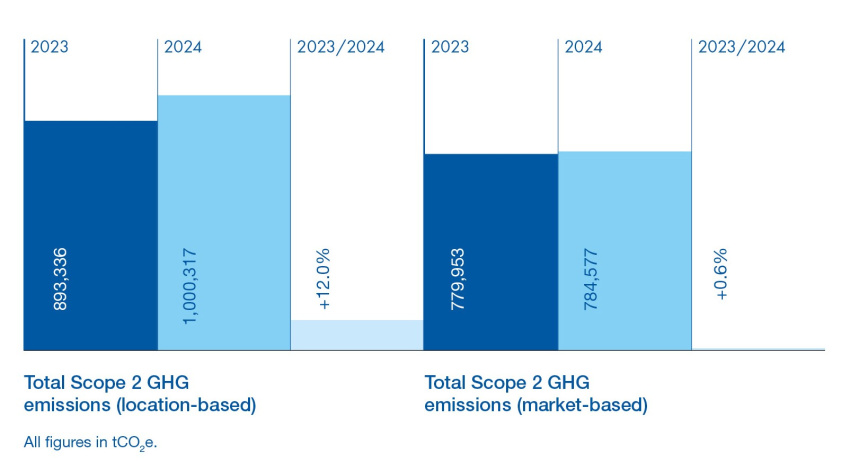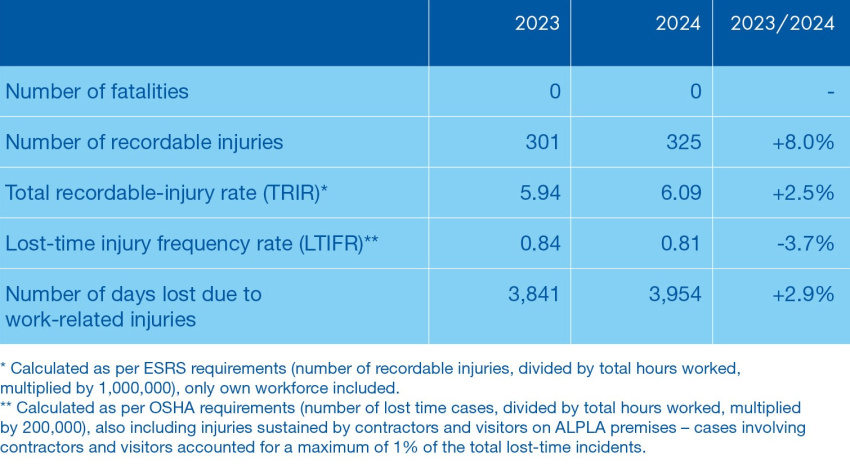- Sustainability Report 2023-2024
- Social information (own workforce)
Policies, targets and actions
ALPLA’s global Code of Conduct underscores our commitment to social sustainability. It aligns with internationally recognized ethical standards and principles, including the Ethical Trading Initiative Base Code, the United Nations Global Compact, the United Nations Guiding Principles, the International Labour Organization (ILO) Violence and Harassment Convention and statute law. We respect and support the values and principles presented in our Code of Conduct, which serve as the foundation for our day-to-day decision-making and actions.
In addition to the Code of Conduct, ALPLA has implemented key policies applicable worldwide to all ALPLA operations to manage the following material impacts on our workforce:
- Anti-Child and Forced Labor: our policy strictly prohibits the use of child and forced labour, human trafficking, and any form of modern slavery in all operations. We ensure that all employment is voluntary and that employees are free to leave their jobs in accordance with legal notice periods and without any form of coercion. Additionally, we ensure that no worker under the age of 15 (or the applicable minimum age in the jurisdiction) is employed unless they are partaking in an apprenticeship approved by relevant government authorities.
- Anti-Discrimination and Harassment: our policy emphasises a zero-tolerance approach towards any form of discrimination or harassment, ensuring a safe and inclusive workplace for all employees. We are committed to treating all employees with dignity and respect, and any instances of harassment or discrimination are addressed through robust grievance mechanisms.
- Working Conditions: our policy aims to ensure safe, healthy and conducive working environments for all employees as well as fair wages, work–life balance and open communication. This aligns with the ILO’s core labour standards, particularly in relation to workplace safety, health and the right to organise. We protect our employees’ rights through regular assessments of our practices and provide remedies in cases where any violations occur.
- Health and Safety: our dedicated policy includes various accident prevention measures, including risk assessments, regular safety training, incident reporting and continuous improvement practices. We are proud to be certified under ISO 45001, which demonstrates our commitment to maintaining a safe and healthy work environment.
We integrate these policies into our core business operations, ensuring that human rights considerations are embedded in everything we do. To ensure compliance with international human rights frameworks, we have established robust processes and monitoring mechanisms. Recognising the various risks associated with our workforce that could impact the organization’s long-term success, our policies address both internal and external risks such as:
- Compliance risks: we conduct regular audits (such as the SMETA 4-pillar audit) to ensure adherence to labour laws and prevent legal issues. These audits cover workplace conditions, wages, grievance mechanisms and many more social topics. We also actively engage with trade unions and worker councils to address emerging concerns and enhance labour practices.
- Employee engagement risks: we conduct regular employee surveys (the latest global ALPLA Culture Survey was conducted in 2024), town hall meetings and employee dialogue to provide employees with a platform to voice their concerns and suggestions. This input is used to refine our policies and practices.
- Health and safety risks: ensuring the health, safety and well-being of our workforce is a top priority, so we continuously introduce workplace safety improvements to mitigate accidents and health concerns.
- Reputational risks: we implement strong anti-discrimination and ethical labour practices to protect the company’s reputation. Moreover, we conduct an annual EcoVadis assessment to ensure our approach aligns with international best practices.
In line with our commitment to sustainability and our focus on the ‘People’ pillar, we have established time-bound and outcome-oriented targets to reduce negative impacts on our workforce. These targets reflect our dedication to fostering safe, equitable and supportive working conditions while promoting well-being and career growth.
These targets are reviewed annually by the relevant corporate-function departments to ensure accountability and progress monitoring.
As part of our commitment to human rights, we have developed and implemented comprehensive processes to provide remedies when rights are violated. This framework includes the following measures:
- We have developed a dedicated global policy on grievance mechanisms that allows employees and workers to report human rights violations, including issues related to discrimination, harassment, workplace safety and other labour rights concerns. This system is accessible and confidential and ensures protection from retaliation. Employees can submit complaints through various channels such as a dedicated whistle-blowing hotline, email or face-to-face meetings with human resources or management.
- Once a grievance is reported, the necessary verifications and/or investigations are initiated in an objective and prompt manner by the Compliance Officer (together with regional or local management of the respective location). If the complaint is substantiated, appropriate remedies are provided, which might include compensation, reassignments, policy changes or disciplinary measures against those responsible. The progress and implementation of the corrective measures are closely monitored until completion and resolution of the case.
- The victim has the right to access external dispute resolution and other judicial or non-judicial remedies without interference or repercussions from the company, if they so choose. This is without prejudice to the employee’s rights under applicable laws and regulations.
In addition to managing risks and ensuring a proper remedy in the case of human rights violations, we also focus on creating opportunities that support the growth and development of our workforce. These opportunities contribute to employee satisfaction, organisational productivity and long-term sustainability.
- Health and safety: we conduct regular workplace audits and internal assessments, organise safety drills and host initiatives to support and promote mental and physical health as well as stress management. A dedicated health and safety team is in place at HQ as well as regional/local levels to monitor compliance with established standards and ensure a hazard-free environment. In cases of workplace injuries or safety concerns, we ensure immediate medical support (by our trained first aiders and professionals if needed), investigate the root cause and take corrective measures to prevent recurrence.
- Upskilling and reskilling: supporting career growth and job security is a key priority in our workforce strategy. We offer internal and external training in emerging skills (such as Digitisation Skills, Operational Skills, Leadership Skills, Global Thinking and Innovation, Finance Expertise and Project Management) to align our workforce capabilities with future business needs and enhance the resilience of our employees to market disruptions. Moreover, we have redesigned leadership development programmes, coaching, job shadowing opportunities, cross-country assignments and enhanced internal mobility programmes. These initiatives ensure employees can align their career aspirations with organisational needs while gaining diverse experience.
- Continuous learning opportunities: we strengthen our internal library of technical and non-technical resources, available on our internal ALPLA Academy platform, to ensure our employees have constant access to knowledge and are encouraged to develop new skills and adapt to market trends.
- People and talent development: we elevate the quality of our talent management process and employee dialogue, improve our mentorship programme and redesign our leadership programmes to cultivate future leaders within the organisation.
- Employee engagement: we build a culture of trust and transparency to boost productivity and innovation, including open and constructive feedback in annual employee dialogue, employee surveys, town hall meetings, worker council meetings, etc. We also encourage collaborative work environments, team-building activities and recognition programmes to strengthen employee connections and create a positive workplace culture.
- Employer branding and retention: we position the organisation as an employer of choice through initiatives like the ALPLA Ambassador Programme and the revamped Employer Value Proposition (EVP), which enhances advocacy opportunities, fosters a sense of belonging and clearly communicates company values to current and prospective employees, supporting employee retention and engagement.
To effectively manage its material impacts related to its workforce, ALPLA allocates resources in a structured and integrated manner, ensuring alignment with its sustainability priorities and business strategy. We have dedicated HR and HSE teams and specialists who focus on managing material impacts both at global and regional/local levels. Specific budgets are also set aside to address material impacts, with funding directed towards initiatives like advanced technologies, tools and programmes aimed at reducing negative impacts and driving positive change in our workforce. We rely on modern data systems and analytics tools to monitor, report and improve our sustainability performance. These platforms provide us with insights to track our progress and identify areas for improvement.
Metrics
Own workforce
The 2023 and 2024 reporting periods provide an insight into key human capital indicators across our workforce. The data presented below is based on a fixed cut-off date, reflecting the workforce composition at the end of each year.
All KPIs, except those specifically concerning external employees, refer exclusively to internal employees and exclude external workers such as agency personnel. The data on employment type (part-time or full-time) and age distribution covers at least 98% of the internal employees, which represents a minor limitation in the current data set. To address such gaps and enhance future data completeness and consistency, we are currently implementing a new globally integrated HR data suite which will support improved reporting capabilities.
The tables below offer a nuanced overview about the evolution of the composition of our workforce.
Gender breakdown
Employment type breakdown
Age structure
People with disabilities
Retention rate
At ALPLA, the retention rate reflects our ability to retain talent by measuring only employee resignation. This metric excludes employer-initiated separation, retirement or contract completion, focusing solely on those who choose to leave the company on their own accord. The increase of the retention rate by 1.7% is a positive sign for the impacts of continued employee engagement and organisational stability.
Learning and development
Health and safety
All employees – 100% of ALPLA’s own workforce – were covered by the company’s Health & Safety and Environment (HSE) management system in 2023 and 2024, aligning with legal requirements and international standards. All figures presented below refer to the total workforce, including non-employees and apprentices.
As in previous years, ALPLA recorded zero work-related fatalities during the reporting period. The number of recordable workplace injuries increased from 301 in 2023 to 325 in 2024, while the total recordable -injury rate (TRIR) rose only slightly from 5.9 to 6.1 as the total hours worked increased by 5%. The lost-time injury frequency rate (LTIFR), indicating the number of more severe accidents with lost days as a direct consequence, decreased slightly from 0.84 to 0.81 during the reporting period. (In line with the figure used in the related target, the LTIFR reported here adheres to OSHA guidelines.) The number of recordable work-related ill-health cases remained at zero in both years, as it had been in previous years.
An analysis of injuries showed that contusion (bruises) was the most frequent type, making up 34% of all recordable accidents, followed by laceration (cuts) at 20%. To address HSE risks, ALPLA implemented a range of corrective actions, including enhanced machine guarding, revised risk assessments, the introduction of new personal protective equipment and site-specific safety training.
Other
In 2024, there were 21 complaints related to harassment in the workplace, down from 26 cases in 2023. Five complaints were substantiated in 2024 (3 in 2023), with none of them having severe impacts. Upon investigation, appropriate measures were taken; fines, penalties or compensation were not imposed in any of the cases.

